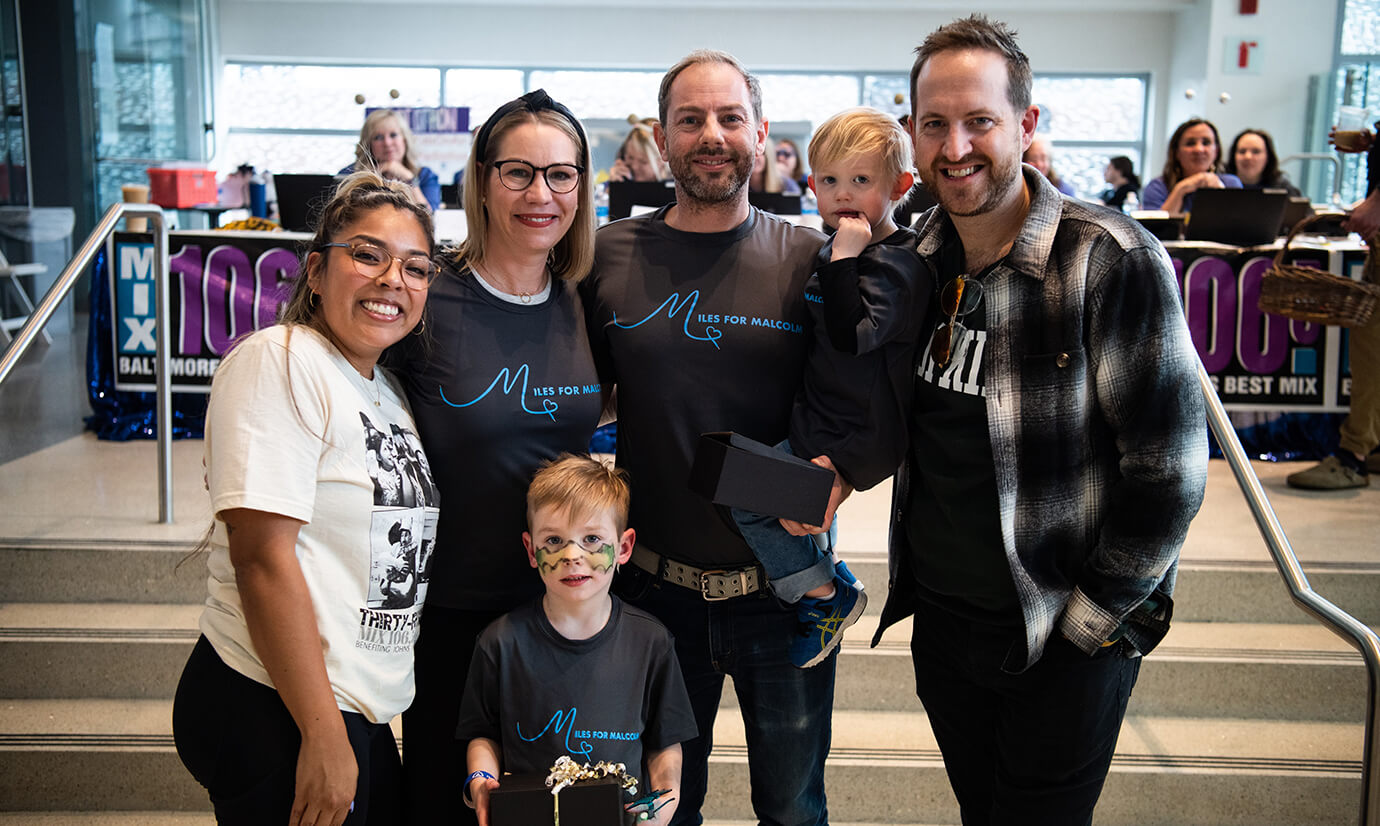Keeping Malcolm's Memory Alive

Lauren Grossman with Malcolm
 The Grossman family, flanked by Miles for Malcolm supporters.
The Grossman family, flanked by Miles for Malcolm supporters.After a medical emergency at their local hospital, Lauren and Joe Grossman had their just-born son, Malcolm, transferred to the neonatal intensive care unit (NICU) at the Johns Hopkins Children’s Center. Following Malcolm’s birth, his brain had been deprived of oxygen for 15 minutes, and he needed cooling therapy, an intervention used to allow a baby’s body to use less energy and heal. At the Children’s Center, Lauren and Joe, who have two older sons, ages 6 and 4, say their family received compassionate care from Malcolm’s team of providers for eight hours until Malcolm was taken off of medical support.
“The doctors and nurses sat with him, they held him, they sang him lullabies,” says Lauren, a pediatric neuropsychologist. “His doctor made sure to say that it was an honor for her to be able to care for Malcolm. I think that’s a wonderful thing to say. And they gave us as much time as we needed with him.”
“Even after Malcolm passed, they were sitting with him and singing,” adds Joe, an attorney with the Social Security Administration.
In the next several weeks, Lauren and Joe decided they wanted to raise funds for the Children’s Center’s NICU in honor of Malcolm. With the help of the Children Center’s development team, Lauren set up a donation page, which she and Joe circulated on social media. They raised around $20,000, a portion of which is being used to introduce a new program to the NICU: Supporting and Enhancing NICU Sensory Experiences (SENSE). Created by Bonnie Pineda, a neonatal therapist and an assistant professor at the University of Southern California, the SENSE program provides actionable steps that parents and caregivers can take to help their premature babies, ages 23 to 40 weeks, have positive experiences with their five senses.
“The NICU is a stressful and scary place for babies and their families,” says Kathleen Martin, lead clinical nurse, who has practiced in the Children’s Center’s NICU for 37 years. “This program is going to help parents to have more individualized opportunities to engage with their babies. This will help build the parents’ confidence and abilities to care for their babies, especially as they get closer to going home.”
Martin says the funding raised by Lauren and Joe has supported a two-hour introductory training for 25 providers, including nurses, occupational therapists and physical therapists. She also purchased a SENSE program license and accompanying materials. After the initiative launches in May, Martin plans to schedule a two-hour online meeting with Pineda to answer questions and address any challenges. Parents and caregivers can access the training on their devices, but informational sheets describing the recommended positive sensory experiences for each baby’s age will also be placed in the room for each family’s reference.
If babies are 28 weeks old, for example, the program instructs parents/caregivers to expose them to one hour of positive touch, such as hand holding or skin-to-skin contact, and three hours of parent scent. Reading, talking or singing to them for at least 20 minutes a day will develop their auditory sense, and shielding them from bright light will protect their visual sense. To promote positive oral experiences, parents can put some breast milk on a swab and gently rub it on their lips.
For Lauren and Joe, supporting the Children’s Center in this way is keeping Malcolm’s memory alive. “I haven’t had a grief like this before, and I needed to do something with that and for him,” says Lauren.
“We say this gives him a voice,” Joe says.
